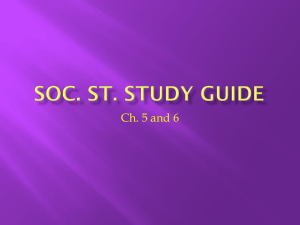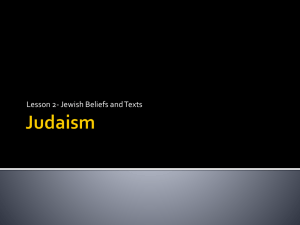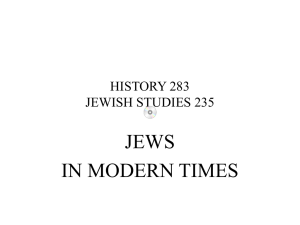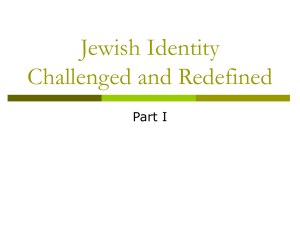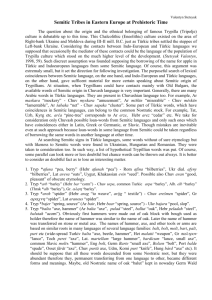Spring 2015 Courses
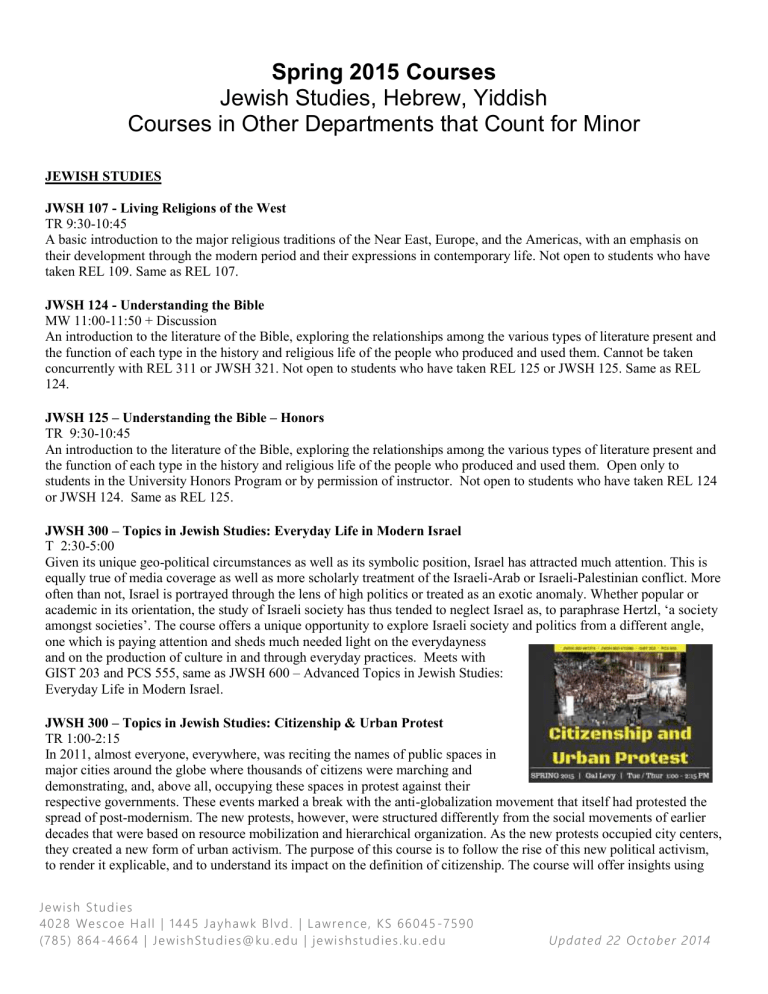
Spring 2015 Courses
Jewish Studies, Hebrew, Yiddish
Courses in Other Departments that Count for Minor
JEWISH STUDIES
JWSH 107 - Living Religions of the West
TR 9:30-10:45
A basic introduction to the major religious traditions of the Near East, Europe, and the Americas, with an emphasis on their development through the modern period and their expressions in contemporary life. Not open to students who have taken REL 109. Same as REL 107.
JWSH 124 - Understanding the Bible
MW 11:00-11:50 + Discussion
An introduction to the literature of the Bible, exploring the relationships among the various types of literature present and the function of each type in the history and religious life of the people who produced and used them. Cannot be taken concurrently with REL 311 or JWSH 321. Not open to students who have taken REL 125 or JWSH 125. Same as REL
124.
JWSH 125 – Understanding the Bible – Honors
TR 9:30-10:45
An introduction to the literature of the Bible, exploring the relationships among the various types of literature present and the function of each type in the history and religious life of the people who produced and used them. Open only to students in the University Honors Program or by permission of instructor. Not open to students who have taken REL 124 or JWSH 124. Same as REL 125.
JWSH 300 – Topics in Jewish Studies: Everyday Life in Modern Israel
T 2:30-5:00
Given its unique geo-political circumstances as well as its symbolic position, Israel has attracted much attention. This is equally true of media coverage as well as more scholarly treatment of the Israeli-Arab or Israeli-Palestinian conflict. More often than not, Israel is portrayed through the lens of high politics or treated as an exotic anomaly. Whether popular or academic in its orientation, the study of Israeli society has thus tended to neglect Israel as, to paraphrase Hertzl, ‘a society amongst societies’. The course offers a unique opportunity to explore Israeli society and politics from a different angle, one which is paying attention and sheds much needed light on the everydayness and on the production of culture in and through everyday practices. Meets with
GIST 203 and PCS 555, same as JWSH 600 – Advanced Topics in Jewish Studies:
Everyday Life in Modern Israel.
JWSH 300 – Topics in Jewish Studies: Citizenship & Urban Protest
TR 1:00-2:15
In 2011, almost everyone, everywhere, was reciting the names of public spaces in major cities around the globe where thousands of citizens were marching and demonstrating, and, above all, occupying these spaces in protest against their respective governments. These events marked a break with the anti-globalization movement that itself had protested the spread of post-modernism. The new protests, however, were structured differently from the social movements of earlier decades that were based on resource mobilization and hierarchical organization. As the new protests occupied city centers, they created a new form of urban activism. The purpose of this course is to follow the rise of this new political activism, to render it explicable, and to understand its impact on the definition of citizenship. The course will offer insights using
Jewish Studies
4028 Wescoe Hall | 1445 Jayhawk Blvd. | Lawrence, KS 66045 -7590
(785) 864-4664 | JewishStudies@ku.edu | jewishstudies.ku.edu Updated 22 October 2014
Israel as a case study, as well as gaining comparative perspectives from other events and other places. Meets with GIST
203 and PCS 555, same as JWSH 600 – Advanced Topics in Jewish Studies: Citizenship & Urban Protest.
JWSH 300 – Topics in Jewish Studies: Archaeology of Ancient Israel
MWF 9:00-9:50
An exploration of the archaeology, art, sites, and monuments of ancient Israel from the Neolithic period to the Roman
Empire. Special topics will include the cultures of the region, nomadism and urbanization, and political and religious history. Attention will be given to how textual sources such as the Hebrew Bible, Egyptian texts, and the Neo-Assyrian
Annals can be used in conjunction with archaeology to reconstruct the region’s history. Meets with CLSX 375.
THE HISTORY OF
JEWISH WOMEN
JWSH 300 / HIST 390 / WGSS 396
SPRING 2015 ~ TUESDAY ~ 2:30-5:00 PM ~ F.G. STERNBERG
THIS COURSE IS MADE POSSIBLE BY THE ERNEST DOROTHY STEIN MEMORIAL FUND
JWSH 300 – Topics in Jewish Studies: History of Jewish Women
T 2:30-5:00
Given This course surveys the history of Jewish women from antiquity to the 20 th century. It examines the historical constructions of women's gender roles and identities in Jewish law and custom and their social and cultural impact in the context of the realities of women's lives in Jewish as well as non-Jewish society. Meets with HIST 390 and WGSS 396.
JWSH 300 – Topics in Jewish Studies: History of Jewish Prayer & Sabbath
TR 1:00-2:15
JWSH 300 – Topics in Jewish Studies: Undergrad Seminar: Apocalypse!
TR 1:00-2:15
In 2011 a preacher gained widespread attention for his claim that Jesus Christ would return to earth on May 21 and that the world would end the following October. 2012 was dominated by rumors of the so-called “Mayan Apocalypse.”
According to a 2010 Pew Research poll, 41% of Americans believe Christ will return by 2050. The Left Behind series, which focuses on the end times, has become an international media phenomenon. In this seminar, we will focus on the roots of this continuing interest in the end of the world. We will examine the ancient texts (especially the biblical books of
Daniel and Revelation) that first express apocalyptic ideas, and consider the development of these ideas over time. We will also look at their ongoing impact, and consider why they have proven so compelling to many in the modern world.
Meets with REL 404.
JWSH 311 – Narratives of Jewish Life
MW 11:00-12:15pm
The course focuses on the narratives through which Jews made sense of their lives under the impact of the forces of modernity, beginning in the "old world," and moving through the 19th century and into the 20th. The goal is to analyze how the imagination of Jewish writers was captured by the changes in social structures such as new educational, residential and occupational opportunities, leading to increased interactions with the gentile society. Students read and discuss literary works based in the shtetl in revolutionary Russia, and in America. We will also look at memoirs and letters written by ordinary Jews. All assigned texts will be in English.
JWSH 315 – The Spanish Inquisition
MW 2:00-2:50 + Discussion
A broad historical study of the Spanish Inquisition from 1478 to its afterlife in modern culture, including its use in political debates and its depiction in popular culture. Topics include anti-Semitism, the nature of the inquisitorial investigation, the use of torture, censorship and the relationship between the Inquisition, the Spanish monarchy and other religious and lay authorities. Taught in English. Will not count toward the Spanish major.
Same as HIST 325 and SPAN 302.
Jewish Studies
4028 Wescoe Hall | 1445 Jayhawk Blvd. | Lawrence, KS 66045 -7590
(785) 864-4664 | JewishStudies@ku.edu | jewishstudies.ku.edu Updated 22 October 2014
JWSH 325 – Introduction to Judaism
TR 9:30-10:45
Analyzes a selection of the core texts, teachings, and practices of Jewish religious traditions in terms of classical and contemporary understanding. Same as REL 325.
JWSH 343 – The Holocaust in History
W 6:00-8:30 - EDWARDS
This course surveys the Holocaust, focusing primarily on European Jewry. It provides a narrative of the events and a description of the causes, process, and consequences of the
Holocaust; it examines German policy toward the Jews in the context of ideology, bureaucratic structures, and the varying conditions of occupation and domination in Europe under the Third Reich; and it explores the actions and reactions of world Jewry, European populations and governments, the Allies, churches, and political movements. Same as HIST
343.
THE HOLOCAUST
I N HI STORY
JWSH 395 – Study Abroad Topic: Everyday Life in Modern Israel
This course is designed for the study of special topics in Jewish Studies at the junior/senior
SPRING 2015 ~ HISTORY 343 ~JEWISH STUDIES 343
WEDNESDAY ~ 6:00-8:30 PM
EDWARDS CAMPUS ~ F.G. STERNBERG level. Coursework must be arranged through the Office of KU Study Abroad. May be repeated for credit if content varies.
This course meets over Spring Break.
JWSH 490 – Independent Study
Intensive reading or research under faculty supervision.
JWSH 491 – Independent Study, Honors
Honors version of 490. Intensive reading or research under faculty supervision.
JWSH 600 – Advanced Topics in Jewish Studies: Everyday Life in Modern Israel
TR 1:00-2:15
See course description under JWSH 300. Meets with GIST 203 and PCS 555, same as JWSH 300 – Topics in Jewish
Studies: Everyday Life in Modern Israel
JWSH 600 – Advanced Topics in Jewish Studies: Citizenship and Urban Protest
TR 9:30-10:45
See course description under JWSH 300. Meets with GIST 203 and PCS 555, same as JWSH 300 – Topics in Jewish
Studies: Citizenship & Urban Protest
JWSH 600 – Advanced Topics in Jewish Studies: Becoming White: Ethnicity in the US
M 3:00-5:30
Becoming White: The Journey of Ethnic Immigrants to the U.S. Meets with SOC 600.
Jewish Studies
4028 Wescoe Hall | 1445 Jayhawk Blvd. | Lawrence, KS 66045 -7590
(785) 864-4664 | JewishStudies@ku.edu | jewishstudies.ku.edu Updated 22 October 2014
HEBREW & YIDDISH
HEBR 120 – Elementary Israeli Hebrew II
MTWTF 10:00-10:50
A continuation of HEBR 110. Note Students with other previous experience in Hebrew must take a placement exam.
Prerequisite: HEBR 110.
HEBR 220 – Intermediate Israeli Hebrew II
MWF 9:00-9:50
A continuation of HEBR 210. Note: Students with other previous experience in Hebrew must take a placement exam.
Prerequisite: HEBR 210.
HEBR 240 – Biblical Hebrew II
This is a continuation of Hebrew 230. It continues the study of the grammatical structure and vocabulary of biblical
Hebrew, and includes biblical texts for students to translate and analyze. Prerequisite: HEBR 230 or permission of the instructor.
HEBR 350 – Advanced Israeli Hebrew II
MWF, 11:00-11:50
Continued advanced study of modern Hebrew. Not open to native speakers of
Hebrew. Prerequisite: HEBR 340 or permission of the instructor.
HEBR 490 – Independent Study in Hebrew
Intensive reading or research under faculty supervision. Not open to native speakers of Hebrew. Prerequisite: HEBR 220 or equivalent.
YDSH 490 – Independent Study in Yiddish
Intensive reading or research under faculty supervision.
רקחמ תירבע
HEBREW
Spr i n g 2015
HEBR 120
EL EM EN T A R Y
H EB R EW I I
MTWRF 10:00 - 10:50
HEBR 3 50
A D V A N CED
H EB REW I I
M WF 11:00-11:50
HEBR 24 0
B I B L I CA L
H EB REW I I
By APPT
HEBR 210
I N T ER M ED I A T E
H EB REW I I
M WF 9:00-9:50
HEBR 4 9 0
I N D EPEN D EN T ST UD Y
H EB R EW
BY APPT
COURSES IN OTHER DEPARTMENTS
HA 305 – Special Study in the History of Art: History of the Islamic City
MW 9:30-10:45
This course will explore the formation of the city in Islam through a survey of specific urban configurations and general development from AD 600-1800 in the Central Islamic lands specifically, in addition to case studies presented from North
Africa, Spain and India. The aim of the course is to move beyond essentialist questioning of the Islamic city and explore the inter-animated and complex web of forces that drive urbanism forward. A central theme of this course will be the interaction of patronage and ceremonial within the city as well as the impact of Islamic institution development on the generation of urban and architectural form. Further to this, the course aims to identify and explore tools for the mapping of urban development through the interrelations of cultural and religious transformation. The intent is not to qualify what makes a city Islamic but rather to identify what can be considered a repertoire of underlying logic for cities under Islamic rule. The course also includes a component that aims to examine the history of the scholarship of the city in Islam in order to better understand the transformations that led to current scholarly views. The course will focus on the cities of Mecca,
Madina, Damascus, Jerusalem, Baghdad, Cordoba, Cairo, Isfahan, Istanbul, and Delhi primarily but will include other case studies from a variety of sites across the Islamic world. It concludes with an examination of the impact of the historical city on current urban concerns in the Islamic world.
Meets with HA 505 and GIST 203.
Jewish Studies
4028 Wescoe Hall | 1445 Jayhawk Blvd. | Lawrence, KS 66045 -7590
(785) 864-4664 | JewishStudies@ku.edu | jewishstudies.ku.edu Updated 22 October 2014
Jewish Studies
4028 Wescoe Hall | 1445 Jayhawk Blvd. | Lawrence, KS 66045 -7590
(785) 864-4664 | JewishStudies@ku.edu | jewishstudies.ku.edu Updated 22 October 2014



